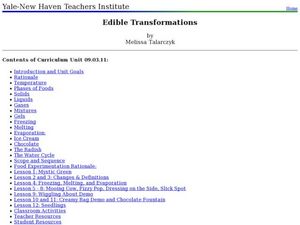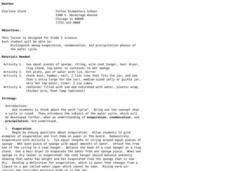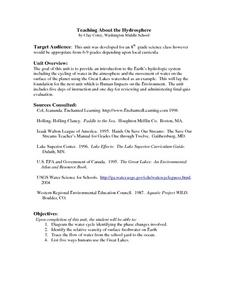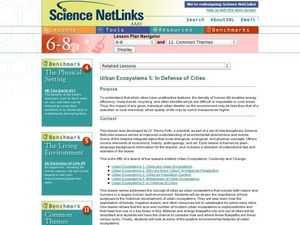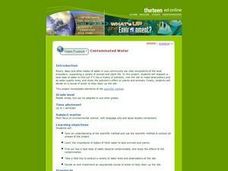Curated OER
Solid Water
Students turn solid water (ice) into liquid water. In this solid and liquid water lesson plan, students use water, ice, cups, and heat in order to change water from one state to another. They draw their findings as well.
Curated OER
The Many Phases of the Moon
Fifth graders explore the phases of the moon as it relates to the calendar.
Curated OER
Warming by Freezing
Ninth graders discover the reasoning behind spraying water on fruit and seedlings in preparation for hard freezes. In this conceptual physics lesson, 9th graders conduct an experiment to measure the heat released when water goes from a...
Curated OER
Edible Transformations
Students differentiate the different phases of matter. In this chemistry lesson, students conduct several hands-on exercises to discover how matter transforms when mixed together. They identify the different stages in the water cycle.
Curated OER
Weather
Fifth graders study the water cycle. In this science lesson plan, 5th graders distinguish among evaporation, condensation, and precipitation phases of the water cycle.
Curated OER
Science Videos
Students plan, practice, and act in a 2-3 minute videotaped production about a specific topic. Students from a local high school give presentations pertaining to seasons, earth rotation, and moon phases. Students analyze the...
Curated OER
Teaching About the Hydrosphere
Eighth graders are introduced to the Earth's hydrologic system including the cycling of water in the atmosphere and the movement of water on the surface of the planet using the Great Lakes watershed as an example.
Curated OER
Heating Curve Lab
Tenth graders examine the heating curve of water when head is added constantly over time. They input values into a calculator as they record water temperature every thirty seconds as it is heated on a hot plate. They complete the...
Science Geek
Thermochemical Calculations
Viewers learn where the heat goes when phase changes take place with a presentation that explains the latent heat of phase changes, or, more specifically, the molar heat of fusion, solidification, vaporization, and condensation. The show...
It's About Time
States of Matter: Solid, Liquid, and Gas
Solid, liquid, and gas: they all matter. Scholars create an animation of the various states of matter, experiment with the temperature of water as it changes states, and observe carbon dioxide as it changes states. The lesson also...
Science Geek
Basic Thermochemistry
Heat is more than just temperature, as viewers discover throughout a presentation about thermochemistry that emphasizes vocabulary. Definitions include joule, calorie, energy, enthalpy, calorimetry, exothermic and endothermic process,...
Colorado State University
Why Can Warm Air "Hold" More Moisture than Cold Air?—Vapor Pressure Exercise
Does it feel a little humid in here? Learners assume the role of water vapor in the atmosphere as they explore the differences between warm and cold air. They roll dice to determine their level of energy, which determines if they stay...
Science Friday
Sublime Sublimation
Dry ice isn't dehydrated water, and young scientists learn why in this fascinating presentation. After watching a video, they complete three different activities using dry ice. Upon completion, they discuss the scientific principle.
Royal Society of Chemistry
Investigating Temperature Changes on Evaporating Liquids—Microscale Chemistry
Is there more to evaporation than just less liquid? Show young scientists the energy transformation that occurs during a phase change through a series of simple experiments. Lab partners place drops of water, ethanol, and ethoxyethane on...
Curated OER
What is in the Water?
In this mixtures worksheet, students read about mixture and what determines if a solute dissolves in a solvent. They answer three questions about solutions and determine from a list of compounds which are soluble in water.
Curated OER
Regents High School Examination: Physical Setting Earth Science 2008
Throughout this earth science exam, high-school geologists complete a series of multiple choice and short answer questions about the solar system, atmosphere, and earth system. This is an amazing test, as are all of the exams developed...
Curated OER
The Power of Ice
In this the power of ice worksheet, students conduct an experiment with freezing water by hypothesizing, following the four step procedure and writing a conclusion.
Curated OER
Water and Ice
Students investigate what happens to solids and liquids when they change from one form to another. The amount od space taken by frozen water begins the discussion and students are led to formulate their own hypothesis to research.
Curated OER
Contaminated Water
Students review and use the steps in the scientific method to complete the experiment. In groups, they research the importance of water to plants and animals in their local area. They examine how water can become contaminated and take...
Curated OER
Heating Curve
Wow! This is a nifty presentation for teaching high school chemists about the heating curve. It displays a graph for temperature vs. heat added, then enters the curve itself. The final slide identifies each part of the curve. Notes are...
Curated OER
BioFuels: The Chemistry and Economics of Alternative Fuels
Junior chemists manufacture biodiesel in the lab. In this exercise, they check the purity of the biodiesel using thin layer chromatography. They also calculate its density and heat of combustion. They are sure to rise to the challenge...
Virginia Department of Education
Changes in Ecosystems
How does water pollution affect the environment? Provide your class with the resources to answer this question as they learn about eutrophication and ecosystem changes. Over two weeks, they simulate the effects of pollution on the...
DiscoverE
Shaky Ground
You're on solid ground if you decide to use the resource. A simple activity has young engineers investigate the problem of liquefaction. A battery placed on dry sand will stay standing—but not if scholars add water to the cup.
Howard Hughes Medical Institute
Icefish Blood Adaptations: Antifreeze Proteins
Ever wonder how fish survive in freezing cold water—especially Antarctic waters? Some fish have an adaptation that lowers the freezing point of their life fluids. Learners model these adaptations in two lab explorations. The first...





